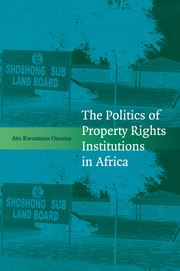Book contents
- Frontmatter
- Contents
- List of Maps and Tables
- Acknowledgments
- List of Abbreviations and Acronyms
- 1 Map of Botswana
- 2 Map of Ghana
- 3 Map of Kenya
- 1 Divergent Attitudes Towards Property Rights Institutions
- 2 Explaining Institutional Choice and Change
- 3 Varying Responses by Ghanaian and Batswana State Leaders
- 4 Traditional Leaders Take Charge in Akyem Abuakwa and Ga
- 5 Building and Then Demolishing Institutions in Kenya
- 6 Endogenous Contributions to Institutional Change
- 7 Conclusion
- Appendix: Notes on Field Research
- Index
- References
2 - Explaining Institutional Choice and Change
Published online by Cambridge University Press: 04 May 2010
- Frontmatter
- Contents
- List of Maps and Tables
- Acknowledgments
- List of Abbreviations and Acronyms
- 1 Map of Botswana
- 2 Map of Ghana
- 3 Map of Kenya
- 1 Divergent Attitudes Towards Property Rights Institutions
- 2 Explaining Institutional Choice and Change
- 3 Varying Responses by Ghanaian and Batswana State Leaders
- 4 Traditional Leaders Take Charge in Akyem Abuakwa and Ga
- 5 Building and Then Demolishing Institutions in Kenya
- 6 Endogenous Contributions to Institutional Change
- 7 Conclusion
- Appendix: Notes on Field Research
- Index
- References
Summary
PART I: INSTITUTIONAL CHOICE AND STABILITY
In November 2004, I visited the mining town of Obuasi, the main base of Anglogold-Ashanti (formerly Ashanti Goldfields) in Ghana's Ashanti Region, to conduct some interviews for this book. While there, I interviewed Nasiru Muntari, a staff member of the state's Town and Country Planning Department, about land administration and property rights issues in the area. He patiently pointed out some of the problems: Chiefs disputed over land rights; one chief gave the same plot to two or three different people; two chiefs allocated the same land to different people; and so on.
It seemed as if these chiefs – who would otherwise prefer secure property rights – were suffering from distributive conflicts over land and a lack of information about their boundaries and the extent of allocations. Common sense seemed to dictate that if lands were dutifully surveyed, demarcated, and adjudicated, and chiefs were given registers in which they could record allocations, they would surely avoid infringing on each other's parcels and end these problems. So I asked Muntari what the state was doing to help chiefs solve these distributive conflicts and information problems.
Muntari's response was unsettling. He claimed that, after working with chiefs for seventeen years, he had come to the conclusion that chiefs did not want clear boundaries, functional property registers, and an environment devoid of disputes. He argued that the chiefs would sabotage any effort to provide these features.
- Type
- Chapter
- Information
- The Politics of Property Rights Institutions in Africa , pp. 19 - 60Publisher: Cambridge University PressPrint publication year: 2009



